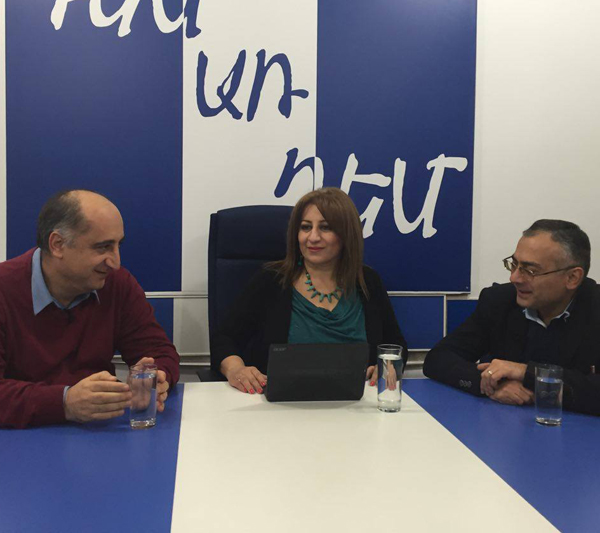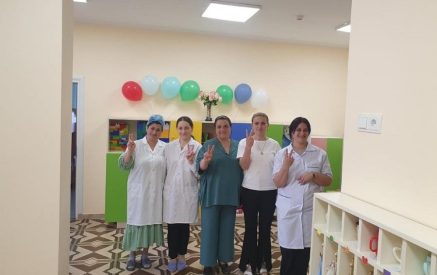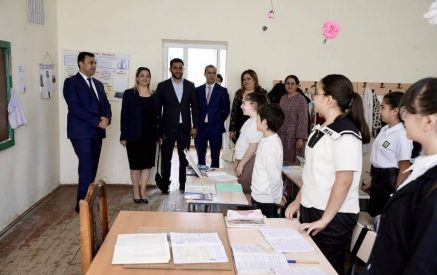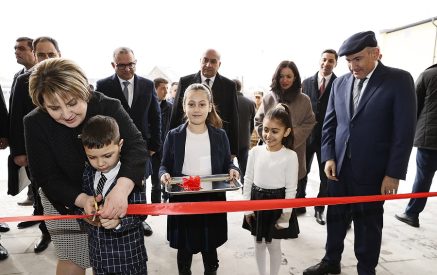The subject of “Aravot” online “Face to Face” program is debated by YSU professor, education expert Serob Khachatryan and Director of the National Center for Educational Technologies Artak Poghosyan.
Gohar Hakobyan – Recently, the media and social networks are stormily discussing Sargis Pashoyan’s quitting of the job, the teacher of History of No. 145 School named after S. Kaputikyan. The experience shows that there is a persecution, barriers and privation in the education system in Armenia for political views, do you agree?
Serob Khachatryan – In a direct sense, there is no persecution for political views. Now, I’ll talk more as a social scientist and will say that the educational system acts as a vulnerable system and, as a result, becomes a victim. This is not just an educational problem, it is more social scientific. I think that such a direct question to ban people thinking otherwise, even if you are a member of an opposition party, I have not seen in our educational system. Today, more another type of technology is put to use, a manipulation technology, in which the educational system is used for specific purposes. Perhaps, our teachers and principals should not largely be members of the ruling party, I communicate with schools teachers for about twenty years and I know that they are the least politicized class of the society, they are less interested in political and party matters, the developments, simply the teachers are one of the lowest-paid classes. Being low-paid people, they were supposed not to be involved in the ruling party, but in some sense, a circumstance is speculated here that there are fewer jobs in the private sector of Armenia or if available, they require high skills, knowledge of English and so on. This leads to the fact that we have an overproduction of teachers in the school system from pedagogical universities, and the system becomes competitive in terms of jobs and employment. As a result, speculating this, the system becomes politicized, but it is not so that the people are politicized forcedly. As I already mentioned, a variety of manipulative technologies are used, ranging from recruiting with dear words and ending with putting up a moral obligation, when, for example, someone’s daughter was accepted to school as a cameraman or a laboratory assistance, they are asking her educational administrator mother to enroll the ruling party. But I know teachers and principals who do not want to be a member of any party.
G. H. – Mr. Poghosyan, do you agree with the observations of Mr. Khachatryan?
Read also
Artak Poghosyan – To some extent I agree with the idea that there is no forced politicization process in Armenia, it is not the case that if you’re working at the school, then you should mandatorily be a member of any political party. I am communicating both with the principals and the teachers, and I know that there are many principals who are non-partisan, even they are reps of oppositional political forces, and I see no bad thing here as such. In my opinion, the problem here is different. First of all, I do not agree that teachers’ salaries are so low, in other words, they are the lowest-paid employees. In the event when one full shift teacher is working, it is more in the regions than in big cities or in Yerevan and I do not think that the opportunity of average wages – 120 000 drams – can be considered a low salary in the regions. On the other hand, generally to prohibit a person to enroll any political party or not be involved in politics, I do not imagine it also. In other words, what should we do? Should we put restrictions by the law that the teachers should not be a member of a political party? We need to think about solving the problem more systematically rather than when specific cases happen, then to address the problem by these cases…
G. H. – But the schoolteacher of No. 145 school Pashoyan had other political views, and look what it turned to be…
A. P. – I do not think that it was the reason, especially when he was writing on his Facebook page that he was late from the classes … I understand that now the opponents are saying, if it were so, let them do it earlier rather than after the referendum. Maybe they should have done it or not have done it at all, maybe it was to be envisaged by a contract what punishment should the person take in case of the failure to perform the duties. Here, there is a question of the status of a teacher, which, unfortunately, has not been solved in Armenia yet, in other words, in many cases, these problems arise from the fact that, for example, the teacher says, you pay me hourly, and I’m doing my lessons, especially the teachers with fewer academic hours. They say, why do you compel us to come from 9 in the morning and stay at the school until 3 or 4 pm if I do not have so much workload. On the other hand, the school principal says, you should come, work on your lessons, get ready for tomorrow’s lessons, work at the library and so on. In short, there are some bilateral problems that require a legal solution, the status of the teacher should be made distinct. For example, this problem also existed in the case of civil servants, and the law on Civil Servants made a clear emphasis that the civil servant has no right to be engaged in agitation during the working hours and should demonstrate political neutrality.
Prepared by Gohar HAKOBYAN,
“Aravot” daily























































